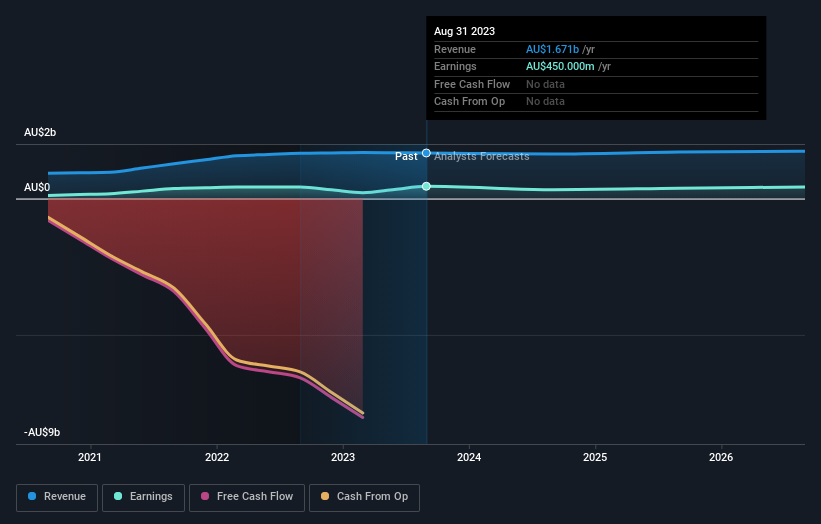Bank of Queensland Limited Just Missed Earnings - But Analysts Have Updated Their Models

As you might know, Bank of Queensland Limited (ASX:BOQ) last week released its latest annual, and things did not turn out so great for shareholders. It wasn't a great result overall - while revenue fell marginally short of analyst estimates at AU$1.7b, statutory earnings missed forecasts by 14%, coming in at just AU$0.20 per share. Earnings are an important time for investors, as they can track a company's performance, look at what the analysts are forecasting for next year, and see if there's been a change in sentiment towards the company. We've gathered the most recent statutory forecasts to see whether the analysts have changed their earnings models, following these results.
See our latest analysis for Bank of Queensland

Following the recent earnings report, the consensus from 14 analysts covering Bank of Queensland is for revenues of AU$1.63b in 2024. This implies a small 2.2% decline in revenue compared to the last 12 months. Before this earnings report, the analysts had been forecasting revenues of AU$1.73b and earnings per share (EPS) of AU$0.56 in 2024. So we can see that while the consensus made a small dip in revenue estimates, it no longer provides an earnings per share estimate. This suggests that the market is now more focused on revenue after the latest result.
Intriguingly,the analysts have cut their price target 5.8% to AU$5.60 showing a clear decline in sentiment around Bank of Queensland's valuation. The consensus price target is just an average of individual analyst targets, so - it could be handy to see how wide the range of underlying estimates is. Currently, the most bullish analyst values Bank of Queensland at AU$9.47 per share, while the most bearish prices it at AU$4.80. Note the wide gap in analyst price targets? This implies to us that there is a fairly broad range of possible scenarios for the underlying business.
Looking at the bigger picture now, one of the ways we can make sense of these forecasts is to see how they measure up against both past performance and industry growth estimates. These estimates imply that revenue is expected to slow, with a forecast annualised decline of 2.2% by the end of 2024. This indicates a significant reduction from annual growth of 13% over the last five years. By contrast, our data suggests that other companies (with analyst coverage) in the same industry are forecast to see their revenue grow 2.8% annually for the foreseeable future. So although its revenues are forecast to shrink, this cloud does not come with a silver lining - Bank of Queensland is expected to lag the wider industry.
The Bottom Line
The most important thing to take away is that the analysts downgraded their revenue estimates for next year. On the negative side, they also downgraded their revenue estimates, and forecasts imply revenues will perform worse than the wider industry. Furthermore, the analysts also cut their price targets, suggesting that the latest news has led to greater pessimism about the intrinsic value of the business.
At least one of Bank of Queensland's 14 analysts has provided estimates out to 2026, which can be seen for free on our platform here.
That said, it's still necessary to consider the ever-present spectre of investment risk. We've identified 1 warning sign with Bank of Queensland , and understanding this should be part of your investment process.
Valuation is complex, but we're here to simplify it.
Discover if Bank of Queensland might be undervalued or overvalued with our detailed analysis, featuring fair value estimates, potential risks, dividends, insider trades, and its financial condition.
Access Free AnalysisHave feedback on this article? Concerned about the content? Get in touch with us directly. Alternatively, email editorial-team (at) simplywallst.com.
This article by Simply Wall St is general in nature. We provide commentary based on historical data and analyst forecasts only using an unbiased methodology and our articles are not intended to be financial advice. It does not constitute a recommendation to buy or sell any stock, and does not take account of your objectives, or your financial situation. We aim to bring you long-term focused analysis driven by fundamental data. Note that our analysis may not factor in the latest price-sensitive company announcements or qualitative material. Simply Wall St has no position in any stocks mentioned.
About ASX:BOQ
Flawless balance sheet with solid track record.
Similar Companies
Market Insights
Community Narratives


